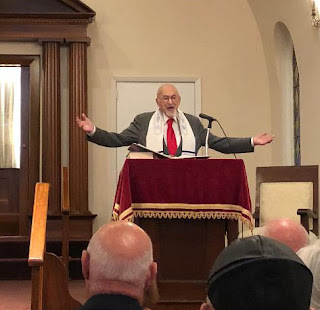Remembering Mobile’s “Rabbi Laureate” Irving Bloom
 |
| Rabbi Bloom at his retirement service in Anniston in 2018 |
Rabbi Paul Irving Bloom, rabbi laureate of Springhill Avenue Temple in Mobile, who also served congregations in Anniston, Gadsden and New Orleans, died peacefully in Atlanta on Jan. 29. He was 88.
A native of Hattiesburg, Bloom spent most of his childhood in Vidalia, Ga., graduating from Vidalia High School in 1948. While in high school, his first job was as a radio announcer, earning $1 an hour. He briefly attended the University of Georgia before transferring to and then graduating from the University of Cincinnati with a degree in political science in 1952. He remained in Cincinnati for full time study at Hebrew Union College-Jewish Institute of Religion, and was ordained a rabbi in 1956. He married Patricia Frankel in 1955.
While at HUC, Bloom served as a student rabbi in Charleroi, Pa., and then at Temple Beth-El in Anniston. Though Anniston wanted him after he was ordained, he fulfilled a commitment to serve as a chaplain in the United States Air Force in Germany from 1956 to 1958.
The Blooms visited bases in Germany, Holland, and France serving the Jewish Air Force personnel there. They were also able to travel to Israel to celebrate the 10th anniversary of the creation of the state.
After his military service, Bloom became assistant rabbi at Temple Sinai in New Orleans, under Rabbi Julian Feibelman, from 1958 to 1960. He then became rabbi of Springhill Avenue Temple until 1973.
While in Mobile, he was involved in many moments of the civil rights movement, and in 1966 he was one of a dozen Southern rabbis interviewed by P. Allen Krause about their civil rights era experiences in communities “of the almost possible” and “of the almost impossible.” The interviews were done with the agreement that they would not be made public for 25 years; it was actually 50 years until the transcripts were published in “To Stand Aside or Stand Alone: Southern Reform Rabbis and the Civil Rights Movement.”
Bloom’s interview is in the “almost possible” category, describing Mobile as a place where progress was made, albeit incrementally.
While Bloom was a full time student at HUC he completed the course work for a Masters in Political Science which he ultimately completed in 1964 when he was motivated to write his thesis on the desegregation of the public schools in Mobile.
Bloom later accepted a position at Temple Israel in Dayton, Ohio and served that congregation from 1973 until his retirement in 1997. During the Dayton years, he held leadership positions in the three major organizations of the Reform Movement: The Union for Reform Judaism (formerly the Union of American Hebrew Congregations), the Central Conference of American Rabbis, and his alma mater, HUC.
After retiring in 1997, he moved to Fairhope, then later to Atlanta. He continued serving as part-time rabbi, traveling approximately monthly to Beth Israel in Gadsden, until its closing in 2011, and to Temple Beth-El in Anniston, until he retired again in June 2018. The Blooms also spent many years serving on cruise ships as the cruise rabbi, and he felt the cruises gave him an opportunity to serve as a rabbi for people with many different backgrounds.
The Blooms were also active in the National Association of Retired Reform Rabbis, serving as its executive directors for four years. By coincidence, Rabbi Howard Kosovske, who currently serves at Springhill Avenue Temple, was just installed as president of the association.
Bloom is survived by his loving wife of almost 65 years, Patricia Frankel Bloom of Atlanta; children, Jonathan (Aurora) Bloom of Columbus, Ohio, and daughter, Judy (Jonathan) Minnen of Atlanta, Ga.; grandchildren, Michael Minnen, Molly Minnen and Ariel Bloom; nephew Michael J. Bloom of Buffalo, N.Y., and niece Nadine A. Bloom of Amsterdam, N.Y. He was preceded in death by his parents, Florence Kaplan Bloom and Herman Bloom, his brother Rabbi Samuel A. Bloom and his sister in law, Eleanor Nadel Bloom.
A funeral is scheduled for Feb. 2 at 11 a.m. at the Springhill Avenue Temple Cemetery in Mobile, with a Shiva reception to follow at the Springhill Avenue Temple. In deference to the funeral, the final screening of this year’s Mobile Jewish Film Festival, scheduled for the afternoon of Feb. 2, has been postponed to Feb. 9.
A memorial service and luncheon will also be held on Feb. 7 at 11 a.m. at Lenbrook in Atlanta.
Memorial can be made to a synagogue or charity of your choice.



